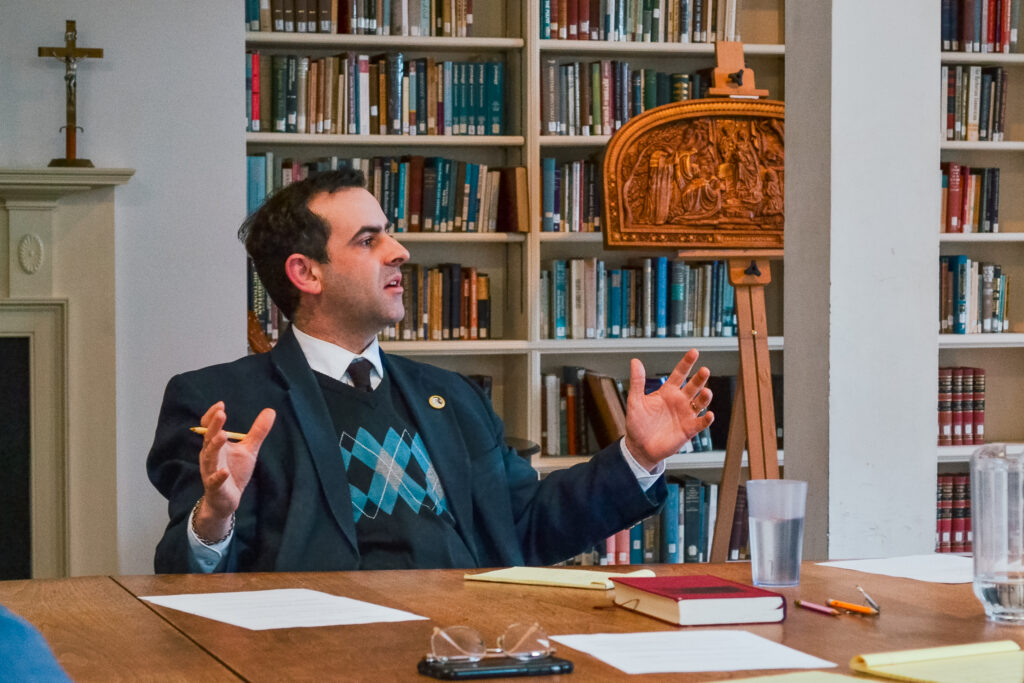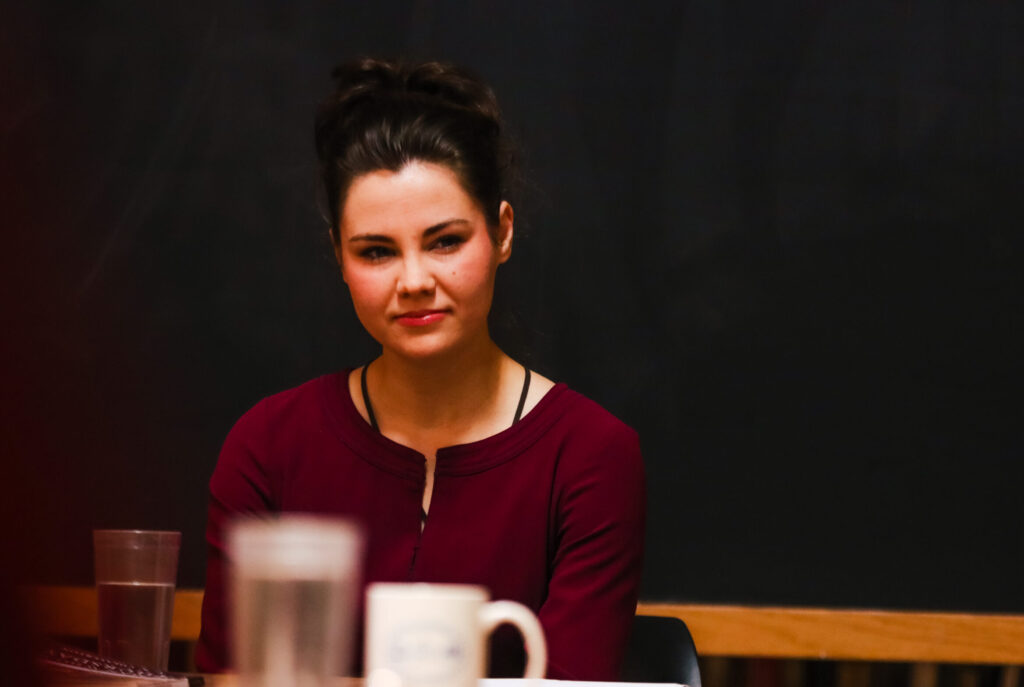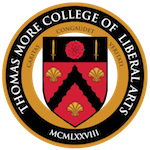By Cassandra Taylor, Publications Assistant
Although final examinations and the end of term are still ahead of us, the Class of 2024 has already cleared one of the most significant hurdles of a student’s career at Thomas More College: the successful defense of his or her Junior Project (JP). A course of independent reading leading to an oral presentation and examination, the Junior Project is undertaken by each TMC student with the goal of demonstrating not only depth of insight into the particular readings completed, but breadth and eloquence as well. The semester-long preparation for the defense is conducted under the direction of a faculty advisor.
The individually selected topics for the JPs tend to be as diverse as the students themselves: in fact, this year’s slate of projects included a selection of sacred music. “Doing Bach’s Mass in B minor, one thing I found especially challenging was keeping track of all the various stylistic influences at play and how each of them related to the different periods of the composer’s life,” commented Joel Marshall ’24, who is also the student director of the Thomas More College Choir. “I found it rewarding to come away with a much better understanding of the importance of this work and the complexity of its structure.” Remarkably, Mr. Marshall was able to draw connections from this particular Mass setting to written works studied previously. “The JPs allow students to pull at a certain strand of what they have encountered in the curriculum and to take a closer look by following that strand off the beaten path,” he continued. “For example, we learned about the importance of chiastic structures during our second-year humanities course, and it turns out that the use of chiastic structures features heavily in the Mass in B minor.”

The thread of chiastic structures in sacred works connects Mr. Marshall’s choice of material to that of Regina Thompson ’24, who dove into the Wisdom of Solomon and passed her defense with honors. “I chose to study the Book of Wisdom out of a desire to contemplate further the depths of the beauty and reason found within this often-overlooked work,” she said. For Miss Thompson, her greatest challenge was the JP’s individual nature. “I found myself intimidated by the idea of studying alone. In class, I was surrounded by my peers; here my companions would be my professors. But my advisor and I were not so much teacher and pupil as fellow students of reason and faith. My previous fear was dismissed as we struggled together with Wisdom’s complexities, and I came to a deeper understanding and love for the work that had prompted so much curiosity.” For Miss Thompson, the defense was a profound moment: “As I later discussed the book with a panel of professors, I felt joy at the opportunity to speak with those I respected so much about such a text.”
“It was indescribably rewarding to spend months diving into one of my favorite books, and discussing it with the faculty in my defense has been one of the greatest highlights of my time here at Thomas More College.”
–Mary Harty ’24
But while Miss Thompson sounded the depths of the Catholic faith through the sensical means of Sacred Scripture, AnneMarie Gerads ’24 chose a different route: the writings of the enigmatic Irish poet Oscar Wilde. After Miss Gerads chose The Ballad of Reading Gaol and The Picture of Dorian Gray over something of Chesterton’s—who was not left out after all, with Anne Serafin ’24 studying The Man Who Was Thursday—she realized that her assumption that Wilde was the easier of the two was a fatal assumption. “Knowing less about the two authors than I actually thought I did, by the end of my journey I could agree with Joseph Pearce’s comment to me that ‘Wilde is confusing, because Wilde was confused,’” she said. “Working through the contradictions in Wilde’s work—paganism mixed with Catholicism—I began to realize that, in spite of his paradoxes, Chesterton may have been ‘easier’ after all, for Chesterton was not confused. Chesterton has the logic of Christianity in all his books, even before converting to Catholicism; Wilde, on the other hand, lived in a constant struggle between Greece and Rome, the latter only triumphing on his deathbed.” For Miss Gerads, studying Wilde’s life opened her perspective beyond a narrow view of the author’s personal story. “I learned a lot about Wilde and his life while preparing my JP, but I also learned a lot about the beauty and fullness of the Catholic faith,” she reflected. “I couldn’t square everything that he wrote, because ‘You cannot serve God and mammon’ (Matt 6:24 DRA). Wilde was trying to do just that, and it is this divided allegiance in his works that made me appreciate the integrity that only the Catholic Church can offer.” Miss Gerads earned an Honors with Distinction for her efforts.

Mary Harty ’24, who also passed with honors, was likewise deeply affected by the work she chose: C.S. Lewis’s That Hideous Strength. “Lewis’s understanding and explanation of human nature is one of the best that I have read in a fictional story. His understanding of the differences between men and women, and how the cultivation or degradation of our human nature affects not only our own humanity but also the common good, has made a lasting impact on my own life,” she stated. For Miss Harty, the JP taught her the importance of balancing her workload and developing time management skills. “One of the most beneficial things you can do for your JP preparation and defense is to take advantage of your advisor and the greater TMC community,” she recommended, continuing, “My advisor was indispensable in supplying supplemental readings and guiding me in the development and honing of my presentation. In addition, my fellow students helped me with advice, editing, and sitting through mock presentations.”
For many, the JP defense—where the student presents to a panel of faculty members and joins in subsequent discussion of the work—is a special capstone to a unique feature of the College’s curriculum. “It was indescribably rewarding to spend months diving into one of my favorite books,” said Miss Harty, “and discussing it with the faculty in my defense has been one of the greatest highlights of my time here at Thomas More College.” “The experience was one that brought our motto to life in a new and personal way,” affirmed Miss Thompson: “truly, charity rejoices in the truth.”
For further reading:
